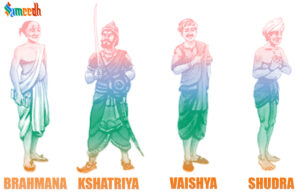In Hinduism, the terms “varna” and “caste” are often used interchangeably, but they have distinct meanings and historical contexts.

Understanding these concepts can provide insights into the complex social structure of Hindu society.
- Varna:
- Meaning: Varna, which translates to “color” or “class” in Sanskrit, refers to the four traditional social classes or categories that were mentioned in ancient Hindu scriptures, particularly in the Rigveda. These classes are:
- Brahmins (priests and scholars): Responsible for religious rituals, teaching, and maintaining sacred knowledge.
- Kshatriyas (warriors and rulers): Involved in protecting the society, governance, and military activities.
- Vaishyas (merchants and farmers): Engaged in agriculture, commerce, and business activities.
- Shudras (laborers and service providers): Performed tasks that were considered less prestigious, providing service to the other three varnas.
- Origins: The varna system is believed to have originated as a means of organizing society based on individuals’ inherent qualities and occupational duties.
- Meaning: Varna, which translates to “color” or “class” in Sanskrit, refers to the four traditional social classes or categories that were mentioned in ancient Hindu scriptures, particularly in the Rigveda. These classes are:
- Caste:
- Meaning: Caste, on the other hand, refers to the social groups or communities that evolved over time within the broader varna framework. Unlike varna, which is theoretically based on qualities and duties, caste often became associated with birth and heredity. The caste system extended beyond the original four varnas, creating numerous subgroups or jatis.
- Origins: Caste distinctions developed as society became more complex, and occupational specialization increased. Over time, caste became associated with social identity, and individuals were typically born into a specific caste, determining their social status, occupation, and even social interactions.
While varna is a theoretical framework that outlines the broad categories of social classes based on qualities and duties, caste is a more practical and complex social reality that developed over time, often incorporating factors like birth, occupation, and social status. It’s important to note that the caste system, with its associated rigidities and hierarchies, has been widely criticized for perpetuating social inequalities and discrimination. Efforts have been made to address these issues in modern India, and constitutional provisions aim to promote social justice and equality.
